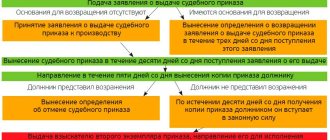An order is a judicial act to collect a debt. It is issued by a magistrate at the request of the creditor (claimant). This action takes place in a simplified manner and without a trial. That is, no debate between the parties with wringing of hands in the courtroom. With the received order, the debtor can immediately contact the bailiffs to demand compensation for the debt.
The bailiff has the right to initiate enforcement, seizure, and sale of assets. For the defendant, these claims may come as a surprise unless, of course, he has received a copy of the document.
Having learned about the beginning of debt collection, you can find the court order by its number or by the name of the defendant. This can be done via the Internet, by searching the FSSP materials, or in the magistrate’s court. Read more about this in our material.
Where to view a court order for debt collection
Let's look at how to find out the number of the court order and familiarize yourself with its contents if you did not receive it at the issuance stage. Note that the debtor can act not only independently, but also through a representative. For example, it could be a lawyer. A representative under a power of attorney will be able to submit requests and applications, receive copies of documents, and appeal against unlawful actions.
Our lawyers are ready to help if you are faced with a penalty under a court order and do not know its number and date of issue.
On the court website
The easiest way is to find a court decision or find out about the case number via the Internet. Such information is published on the website of each judicial authority. Typically, collection is carried out through the magistrate's court at the location (registration) of the defendant. Therefore, to obtain information about the case number, proceed as follows:
- enter the name of the judicial authority in a search engine (if you know it);
- if you cannot indicate the name of the court, it can be found through the GAS Justice information portal (for example, there you can select a judicial body on a graphic map based on your residential address);
- on the court website, go to the “Court Proceedings” tab, select “Search information on cases”;
- in the search form, fill in the data that you have (for example, in many cases you can find a court order by the name of the debtor, even if you do not know the case number);
- in the search results, select the card you need (you can open each card to compare your data);
- on the card you can see the case number, the date of receipt of the material and the issuance of the judicial act, the name and surname of the judge, and other information.
Finding a court order will be difficult if you are only looking for information by last name. Using the most common surnames, a search can even return dozens of cases, especially if we are talking about a magistrate’s court in a big city.
On the website of the judicial authority, you can log into your personal account to gain access to electronic copies of documents. Login is possible using a government services account or digital signature. Without logging into your personal account, you cannot receive a certified copy of the order, but general information will be available even in this case.
If you were able to find out the judge and the case number, you can apply for a copy of the document. To do this, submit a written application addressed to the judge. In the application, be sure to indicate the case number and the date of the judicial act.
In the materials of enforcement proceedings
You can view the court order in the proceedings with the bailiff if compulsory execution has already begun. To view the materials, you must submit an application. You can not only read the text of the court order, but also make a copy of it.
The fastest way to obtain copies of the case materials is to contact the FSSP in person. However, it is advisable to clarify the work schedule of the bailiff handling your case. In addition, during the pandemic, personal reception of citizens is often limited to a few hours a week.
It is not possible to request copies of documents by email. The bailiff is not obliged to respond to such requests. But through government services, you can send almost any request to the FSSP to receive information about the progress of the case. The report or response to the request will also indicate the grounds for the penalty, i.e. number of the judicial act (case).
On the FSSP website
You can check the court order using the enforcement proceedings number on the FSSP portal. There, a databank of all cases initiated by bailiffs is publicly available.
To find a case, in the search form you need to indicate the region and the name of the debtor. It is advisable to indicate your date of birth to get a more accurate search result.
How to find a court order by case number online on the FSSP portal? The search results will provide the following information:
- general information about the debtor;
- number and date of initiation of proceedings;
- number and date of issue of the writ of execution (in particular, the order number will be indicated there);
- a brief description of the subject of collection (for example, the debt and its amount);
- information about the bailiff handling the case (including a telephone number for contact).
Having received this data, you will be able to contact the judicial authority or the FSSP, familiarize yourself with the order or receive a copy of it.
Through government services
It is impossible to directly find out the court decision or obtain a copy of it through government services. But users of government services have the opportunity to:
- send an appeal to the FSSP, including a request for a report on the progress of the proceedings;
- find out about the availability of open collection cases;
- file complaints about unlawful actions of FSSP employees.
There is no unified database of debtors' names in public services. To obtain a copy of the court order, you will still have to contact the FSSP or the court.
Documents of which courts can be found on Arbitr.ru?
The arbitration system in Russia looks like this:
- in the first instance, the case is considered by the arbitration court of a constituent entity of the Russian Federation (for example, the arbitration court of the Sverdlovsk region);
- if any of the parties wishes to appeal the decision of the court of first instance, then it can appeal to the appellate court (for example, to the Seventeenth Arbitration Court of Appeal);
- but the decision of the appellate court is not final. Any of the parties to the case can challenge it in cassation (for example, by appealing to the Federal Arbitration Court of the Ural District);
- Finally, there is also a higher court - the Supreme Court of the Russian Federation. Any party to the case who still hopes for success can appeal the decision previously made by the arbitration court to one of the panels of the Supreme Court of the Russian Federation.
In addition, documents issued by the Intellectual Property Rights Court are also posted on the website in electronic form. He considers disputes related to intellectual property (trademarks, patents, trade names, inventions, etc.).
Is someone required to notify the debtor that a court order has been issued?
Yes, I must. Since the debtor (defendant) is a full participant in the court case. Therefore, he will definitely be sent all the main documents related to the collection. Since writ proceedings do not provide for holding meetings, subpoenas and notices are not sent to the parties. But the judge will definitely send a copy of the order to the debtor, since the determination of the possible deadline for filing objections depends on the date of its receipt.
What the claimant must do
When filing a statement of claim, the plaintiff must send a copy of this document to the defendant. If the documents do not contain evidence that the claim was sent to the defendant, the judge will refuse to initiate the case or simply suspend the case for an indefinite period.
In writ proceedings, everything is a little different. This is how the process goes when issuing a court order:
- the claimant sends the application and other documents directly to the court;
- the collector is not obliged to notify the debtor of the filing of the application in any way;
- Since writ proceedings do not involve court hearings, the applicant and the defendant do not meet at all during the collection process.
It is the responsibility of the collector to indicate the mandatory identifiers of the defendant, his residential address or location. Firstly, this is necessary to send a copy of the order to the address where the document will find the debtor. In addition, the court order must indicate the exact data by which the bailiffs will identify the debtor.
What does the law oblige the judge to do?
The judge presiding over the case is required to send certain documents to both parties. When issuing an order, the responsibilities of the magistrate include:
- sending a copy of the order to the debtor within 5 days after its issuance;
- checking the date of receipt of a copy of the document or the reasons for non-receipt in order to make a decision on issuing an order to the recoverer;
- issuing a ruling to cancel the order if the debtor submits objections in a timely manner.
Judicial proceedings involve maintaining case files, including those related to issued orders. Case cards are available on the websites of judicial authorities to everyone. It is impossible to read the personal data of the participants in the process on the court’s website, but you can get general information about debt collection. In particular, the case card will show the number of the order and the date of its issue, as well as information about the judge.
Also, at the request of the participants in the process, the judge is obliged to provide the case materials for review and for making copies. To submit such an application, you need to know the case number.
How are bailiffs informed about an order?
For the bailiff, the debtor is the most important participant in the proceedings.
Therefore, Law No. 229-FZ obliges the FSSP employee:
- send the debtor a copy of the resolution to initiate the case (among other things, the contents of the resolution will indicate the number of the judicial act and the date of its issuance);
- post information about each production in the Data Bank on the FSSP portal;
- provide the debtor with case materials for review, provide information upon request by mail, through government services or at a personal meeting.
You need to find a court order by its number.
This can actually be done by searching in the case card on the court’s website, in the Data Bank on the FSSP portal. You can familiarize yourself with the contents of the order in the materials of the court case or enforcement proceedings. A copy of the order can be obtained from the FSSP or from the magistrate's court.
A court order is a direct enforcement document. It is submitted to the FSSP by the claimant. Accordingly, the document will be kept on file until the end or termination of the proceedings.



